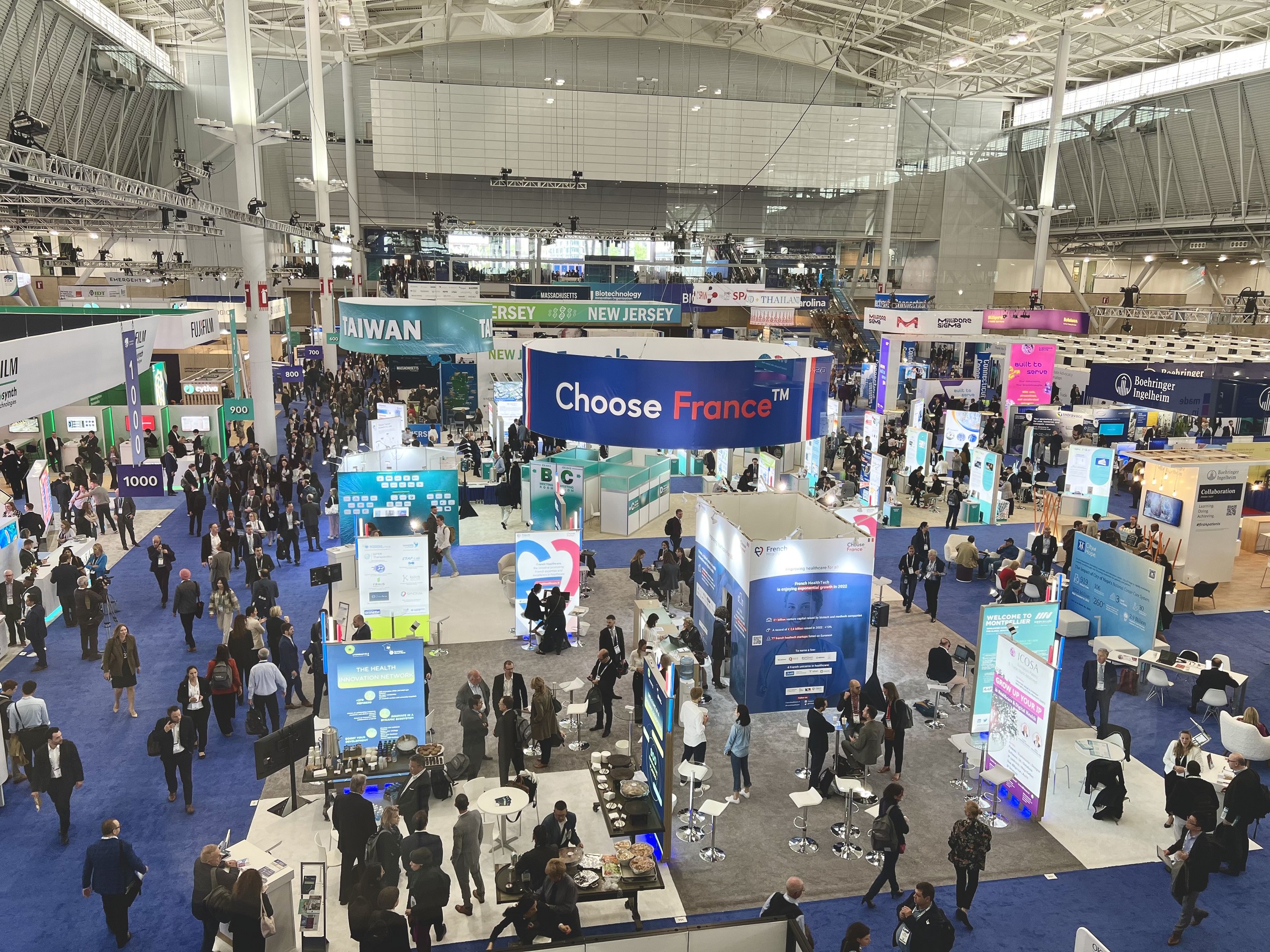The ASCO (American Society of Clinical Oncology) is the world’s leading oncology event. At the beginning of June, it brought together the largest pharmaceutical laboratories, biotech companies and researchers to present their innovations and discover the inventions of others. After two virtual events, the global scientific players were finally able to meet in person.
With 3,000 clinical studies and 5,200 presentations in five days, visitors did not have time to get bored. France confirmed once again that it was at the forefront of cancer research. The specialists at the Institut Curie, Gustave Roussy and the AP-HP presented their work. A number of these specialists received awards.
“Physicians from the Institut Curie will present unique and original research encompassing targeted therapies, treatment combinations and supportive care, geared towards developing new therapeutic strategies. This year again we have a great many papers accepted at ASCO, a testimony to the excellence of our teams, our international reputation and the importance of the productive collaborations that are involved in, in order to further our efforts in the fight against cancer, for the benefit of patients,” Professor Steven Le Gouill, Director of the Hospital Group at the Institut Curie.
- Dr. Étienne Brain received an Award of Excellence for his work on elderly populations
On June 7 Dr. Étienne Brain, oncologist at the Institut Curie, presented the results of the largest study ever carried out on older women with breast cancer. This population, which has been neglected by research and clinical trials, paradoxically represents more than half of the cancers currently diagnosed (60% within ten years). This study aimed to evaluate the relevance of chemotherapy after surgery on 2,000 French and Belgian patients, aged between 70 and 93, and operated on for so-called hormone-sensitive breast cancer (chemotherapy and hormone therapy versus hormone therapy alone). The results showed that the benefit of chemotherapy was not significant for the overall survival rate of elderly women, even those selected for a tumor with a genomic signature (genomic grade), analyzed on a fragment of the operated cancer, in favor of aggressiveness.
“This study may increase awareness of the need to constantly adjust treatments based on the patient’s health status, even in the presence of an unfavorable tumor genomic signature,” Dr. Brain hoped. For the elderly population, dialog with other specialists, such as geriatricians, is essential in order to take into account, in the strategy, the cognitive state, quality of life, autonomy, state of fragility which is not apparent and yet very present and linked to the age of the subject… Chemotherapy should not be the rule, and certainly not the same as that used in younger adults.”
He was presented with The Byrl James Kennedy Geriatric Oncology Award, an award of excellence for outstanding contribution to research in oncology of the elderly. This is only the fourth time that a French researcher has received this award. “This award has undoubtedly been given in recognition of our team effort,” Dr. Brain was pleased to say.
The Career Development Award for Dr. Maria-Alice Franzoi
Medical oncologist and researcher at the Institut Gustave Roussy, Dr. Maria-Alice Franzoi received the Career Development Award for Diversity, Inclusion and Breast Cancer Disparities from Conquer Cancer for her work on the quality of life and breast cancer. Their objective is to apply, at the time the diagnosis is made, an algorithm to identify patients who are at increased risk of a worsening of their quality of life and their ability to self-manage, in order to put in place dedicated procedures. This award is given to brilliant young and particularly promising doctors/researchers.
Four other oncologists and researchers from Gustave Roussy have received a Merit Award for their work presented at the ASCO:
- Dr. Felix Blanc-Durand, medical oncologist, member of the Gynecology committee and researcher, is working on an in-depth description of the immunity micro-environment of ovarian cancers and the influence of chemotherapy on its composition. He is also working on new immunotherapy strategies, beyond PD-1/PD-L1 inhibitors.
- Dr. Lucia Carril-Ajuria, medical oncologist and researcher, was involved in evaluating the efficacy of nivolumab for patients suffering from metastatic kidney cancer and pre-treated in connection with the GETUG-AFU 26 NIVOREN phase-II trial. The study showed soluble factors (IL8 and VEGF) associated with overall survival, survival with no progression of the illness and the response. The results of the cohort of validation, presented to the ASCO, confirm a significant association between the basic blood concentration of IL-6 / IL-8 and poor overall survival/survival with no progression.
- The work of Dr. Filippo Gustavo Dall’Olio, medical oncologist and researcher, relates to the analysis of certain biomarkers derived from the Positron Emission Tomography (PET) (Metabolic Tumor Volume and Total Lesion Glycolysis). It enabled the identification of a category of patients with high-risk non-small cell lung cancer. In these patients, immunotherapy alone has little chance of success and must therefore be complemented by chemotherapy.
- Dr. Vincent Marmouset, medical oncologist and researcher, has led research into PARP inhibitors. The results are promising in several cancers, but also highlight that these inhibitors may be associated with an increased risk of secondary myeloid hemopathies (T-MN). He confirmed that this risk must be taken into account during any oncological follow-up and he showed, within a national cohort, that these secondary hemopathies were associated with poor prognosis, mainly due to a high rate of TP53 gene mutations. Early diagnosis appears to influence survival, which underlines the importance of identifying those at risk. Based on these data, increased monitoring should be performed in patients with BRCA1/2 mutations, long duration of exposure to PARP inhibitors and the occurrence of delayed cytopenias, particularly thrombocytopenia.
The communications of the Institut Curie with the ASCO:
- “Combining radiotherapy and targeted therapy to treat triple-negative breast cancer” – a study coordinated by Dr. Youlia Kirova, radiotherapist oncologist at the Institut Curie.
- “Real-life analysis of hormone therapy data in breast cancer” – a study coordinated by Drs. Luc Cabel and Marcela Carausu, medical oncologists at the Institut Curie.
- “Advanced cervical cancer – what is the role of immunotherapy?” – a study coordinated by Drs. Manuel Rodrigues and Emmanuela Romano, medical oncologists at the Institut Curie.
- “Screening for BRCA1 and BRCA2 mutations in ovarian cancer” – a study coordinated by Dr. Manuel Rodrigues, medical oncologist at the Institut Curie.
- “Pancreatic cancer – an original study to assess the effectiveness of Adapted Physical Activity (APA)” – a study carried out by Dr. Cindy Neuzillet, gastroenterologist, specialist in digestive cancers at the Institut Curie, co-coordinated with Professor Pascal Hammel (AP-HP) for the last 8 years. This phase-3 study trial evaluated the role of adapted physical activity among over 300 patients with advanced pancreatic cancer. Dr. Cindy Neuzillet also carried out and presented two other studies: “Vaccine therapy in metastatic pancreatic cancer” and “Biliary tract cancers – new data on immunotherapy.”
- “Mantel cell lymphoma (non-Hodgkin’s lymphoma that affect the B lymphocytes) – what are the results of a new combination of a targeted therapy and immunotherapy” – a study coordinated by Professor Steven Le Gouill, hematologist, Director of the Hospital Group of the Institut Curie.
- ENT cancers – a phase-3 trial is underway coordinated by Professor Christophe Le Tourneau, oncologist, head of the early trials department at the Institut Curie.
- “Early together, a brand new trial in metastatic uveal melanoma” – multi-center phase-3 clinical trial coordinated by Dr. Sophie Piperno-Neumann, oncologist at the Institut Curie.
The Institut Curie has also organized two conferences:
- on lymphoma – Dr. Carole Soussain, hematologist, shared her expertise at a conference on the treatment of brain lymphomas.
- on pediatric cancers – Dr. Franck Bourdeaut, pediatric oncologist, led a session devoted to immunotherapy in pediatric cancers, presenting his work on rhabdoid tumors and the discovery of an immune reaction that points to the possibility of conducting clinical trials in immunotherapy to treat children with these rare tumors.
48 presentations from Gustave Roussy were selected at the congress. Among the most significant:
– SACHA study carried out by Professor Gilles Vassal. The aim of this study is to systematically collect on a prospective basis efficacy and safety data on innovative therapies prescribed in the context of compassionate access or outside the scope of marketing authorization (MA) in children or adolescents with relapsed or treatment-refractory cancers.
– RAGNAR Study by Dr. Yohann Loriot. Presentation of the interim results of an international study evaluating the efficacy and safety of a new targeted therapy, erdafitinib, targeting FGFR genetic mutations (1,2,3 and 4) in some 15 rare tumors and aggressive cancers.
– FTIH Study by Dr. Laurence Albigès. Presentation of preliminary results. This international Phase-I study evaluating the activity and safety of MEDI5752, a bispecific monovalent antibody anti PD1 and CTL4, shows beneficial results in advanced solid tumors and in particular in advanced renal cell carcinomas.
– Phase-III IDHENTIFY trial by Dr. Stéphane de Botton. Presentation of the results of this study focusing on a new drug, enasidenib, targeting IDH2-R140 and IDH2-R172 gene mutations in refractory or relapsed acute myeloid leukemia, which improves overall survival compared to a conventional care regimen.
The AP-HP present at the ASCO
The AP-HP takes care of one third of the patients in Île-de-France treated for cancer, i.e. 55,000 patients every year. It has also presented several papers at the World Cancer Congress:
– “Optimal cytoreductive liver surgery for unresectable colorectal liver metastases – a prospective observational study,” by Professor René Adam, general surgery department
of the Paul-Brousse AP-HP hospital.
- “Demographics and treatment outcomes in patients with EBV+ PTLD treated with ready-to-use EBV-specific CTLs in an ongoing expanded access program in Europe – initial analyses,” by Dr. Sylvain Choquet, clinical hematology department at the Pitié-Salpêtrière AP-HP Hospital.
- “Efficacy and safety of dostarlimab in patients (pts) with mismatch repair deficient (dMMR) solid tumors – analysis of 2 cohorts in the GARNET study,” by Professor Thierry André, oncology department of the Saint-Antoine AP-HP hospital.
– “Pre-existing autoantibodies as predictors of immune system-related adverse events for advanced solid tumors treated with immune checkpoint inhibitors,” by Dr. Arthur Daban, oncology department of the European Hospital – Georges Pompidou AP-HP.






